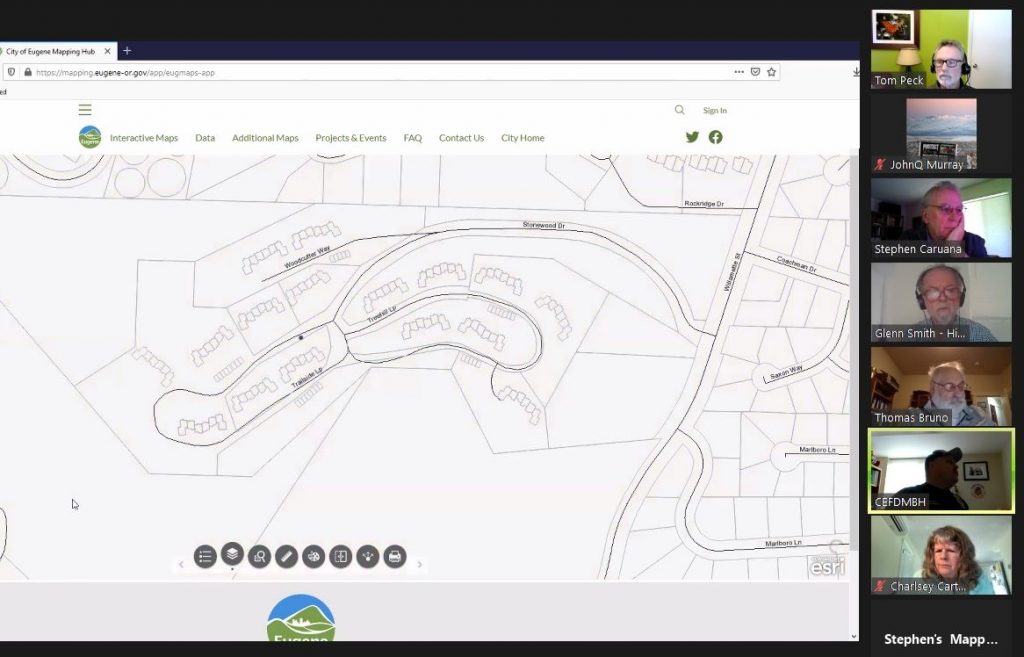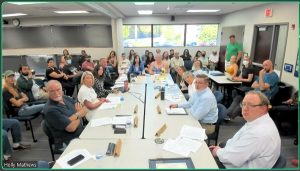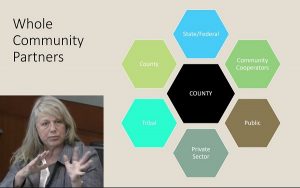Wildfire season: Practicing even one time can save your life
5 min read
Tom Peck, Stephen Caruana, Tom Bruno, Glenn Smith and others are organizing tabletop evacuation drills for neighborhood residents.
Neighbors helping neighbors. In a disaster, that could mean the difference between life and death. After the fast-moving fires of 2020, Eugene neighborhoods are planning for the next wildfire season.
Merrill Harrison: [00:00:13] I’m Merrill Harrison with Eugene Springfield Fire Marshal’s office. I’m a Deputy Fire Marshal with the group, so I’m happy to be involved in these talks.
John Q: [00:00:22] Deputy Fire Marshal Harrison is helping Eugene neighbors talk together about evacuation.
Merrill Harrison: [00:00:28] Groups like you guys are just crucial to the success of any type of emergency planning.
Thank you for supporting
local citizen journalism
Our big goal is awareness, education, and empowerment, right? We want to do whatever we can to get you guys the resources to ensure that neighbor helping neighbor occurs. Because if there is an actual event and we’ve seen this through the snow storm, we’ve seen this through recent events that we’ve had: Immediately, all available resources are going to be tapped, and oftentimes you have to rely on each other. So I’m glad there’s community involvement.
John Q: [00:01:02] One Eugene neighborhood leader, Charlsey, is a survivor of the Camp Fire, which destroyed the California town of Paradise.
Charlsey Cartwright: [00:01:10] I’m Charlsey Cartwright. I live in the River Road area and I’m involved with the River Road Community Organization Emergency Preparedness group. And I’m also a survivor of the Camp Fire in 2018 where I evacuated with my pets… What I want to do for people in this community is just get them started.
John Q: [00:01:35] Deputy Fire Marshal Harrison emphasized that planning must include the whole community.
Merrill Harrison: [00:01:41] As time allows and as we’re able to, we can go to some of our commercial businesses and witness them do evacuation drills, and then we give them advice on maybe how to do things differently. So we activated the alarm, the drill proceeded, everybody got out and the lead for the evacuation walked in to our engine captain and said, ‘Okay, everybody’s out except Carl.’ And we said, ‘Where’s Carl?’ And he said, ‘Ah, he’s on the second floor. He’s got oxygen. He’s older. He’s not gonna make it.’ And I just was like, ‘Oh my gosh, you can’t dismiss Carl. He needs to become a part of your custom plan. People need to be assigned to look after Carl.’ Likewise, in a neighborhood, individuals with disabilities need to be looked after as well.
John Q: [00:02:34] Merrill said neighbors can start with tabletop discussions.
Merrill Harrison: [00:02:37] It’s amazing what you can learn just by getting a group together and talking about it and letting them go through it in their mind, just visualizing the steps they would take, the routes they would take, moving the stuff into the car, realizing the amount of time that would take. And so all those little pieces develop the muscle memory we’re hoping that can occur. And in the long haul, it develops a calmness and an ability to react efficiently and quickly to an emergency and not freeze and stay, right.
John Q: [00:03:10] Charlsey said even a small amount of practice may have saved her life.
Charlsey Cartwright: [00:03:14] This has been such a positive conversation to have because you don’t often have advanced notice. And even though I don’t feel like I rehearsed a lot. The little bit I did, driving the only two routes that were out of our community. One, the day of, was totally blocked off. Having done that, having thought through the process so many times, I went into a zone and I was able to do it on automatic when I needed to, and some of my neighbors wanted to stay at their homes because they’ve been through this before, it’s going to be the same and I wanted out and it saved my life.
What you’re discussing with the tabletops is so comforting because the Fire Safety Council in the Paradise area had the zones. Everybody knew what zone they were in. Everybody knew where to go in an emergency. None of it played out as possible under the circumstances of the Camp Fire, but because we had all gotten a certain high level of awareness, we thought that way. We began to think in terms that we knew what to do and people helped one another.
John Q: [00:04:30] Merrill encouraged the volunteers to take a long-term approach.
Merrill Harrison: [00:04:34] The biggest thing right here with this type of stuff is: Be forgiving of yourself. The first time through, you’re going to feel like there’s no way you will ever succeed at doing anything like this because there’s so many unknowns, and things are going to seem so clunky, are going to seem so foreign, just, that none of it makes sense. It is completely normal to just go, ”Oh my gosh.’
Be forgiving of yourself and I promise the more you do it, the more you work together as a group, the more you help each other, it will all start to make sense and those little avenues to success will appear. And the more you do it again, the muscle memory will develop and you’ll begin to feel a sense of, ‘Okay, it may not be perfect, but by gosh, we’re making progress and we’ll never have it be perfect. We just want to ensure that we’ve prepared ourselves as much as we can so that when, if that time comes, we’re prepared as we can.’ And so just being forgiving of yourself, you’re going to make mistakes. You’re going to have different opinions. Work through it and just keep at it and you’ll absolutely be shocked with your positive results.
John Q: [00:05:42] Charlsey thanked the Deputy Fire Marshal.
Charlsey Cartwright: [00:05:45] Thanks to Merrill for what he just said about being self-forgiving. I dreaded the whole notion of fire preparedness and avoided it for a long time. And when I finally faced it, the moment I threw an article in the back of my car and a Go Bag, I felt the weight of worry and fear just pour off of me. And it became easy to throw in the other things. And I didn’t worry about order initially, I have a cage for my animals and I just started throwing things in, and then it became an ongoing process every day or every week to add to that.
John Q: [00:06:25] Do one thing. Join your neighborhood’s evacuation planning team, with email to: Eug.Fire.Prep.Coalition@gmail.com.



